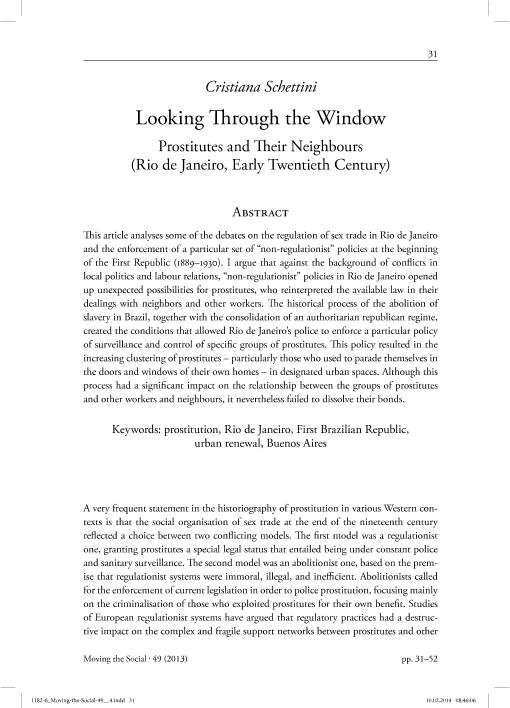Artículo
Looking Through the Window: Prostitutes and Their Neighbours (Rio de Janeiro, Early Twentieth Century)
Fecha de publicación:
12/2013
Editorial:
Institute for Social Movements
Revista:
Moving the Social
ISSN:
2197-0386
Idioma:
Inglés
Tipo de recurso:
Artículo publicado
Clasificación temática:
Resumen
This article analyses some of the debates on the regulation of sex trade in Rio de Janeiro and the enforcement of a particular set of non-regulationist policies at the beginning of the First Republic (1889-1930). I argue that against the background of conflicts in local politics and labour relations, non-regulationist policies in Rio de Janeiro opened up unexpected possibilities for prostitutes, who reinterpreted the available law in their dealings with neighbors and other workers. The historical process of the abolition of slavery in Brazil, together with the consolidation of an authoritarian republican regime, created the conditions that allowed Rio de Janeiro's police to enforce a particular policy of surveillance and control of specific groups of prostitutes. This policy resulted in the increasing clustering of prostitutes particularly those who used to parade themselves in the doors and windows of their own homes in designated urban spaces. Although this process had a significant impact on the relationship between the groups of prostitutes and other workers and neighbours, it nevertheless failed to dissolve their bonds.
Palabras clave:
PROSTITUTION
,
URBAN RENEWAL
,
RIO DE JANEIRO
,
BUENOS AIRES
Archivos asociados
Licencia
Identificadores
Colecciones
Articulos(SEDE CENTRAL)
Articulos de SEDE CENTRAL
Articulos de SEDE CENTRAL
Citación
Schettini Pereira, Cristiana; Looking Through the Window: Prostitutes and Their Neighbours (Rio de Janeiro, Early Twentieth Century); Institute for Social Movements; Moving the Social; 49; 12-2013; 31-52
Compartir
Altmétricas




